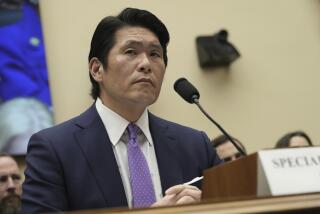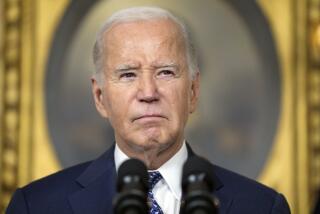Altman Diary to Figure in Whitewater Hearings : Probe: Deputy Treasury secretary emerges as focus of congressional hearings beginning next week.
- Share via
WASHINGTON — Deputy Treasury Secretary Roger Altman kept a diary that contains embarrassing references to First Lady Hillary Rodham Clinton’s anger over Whitewater disclosures and describes her as furious that her husband appointed a special counsel to investigate the tangled financial affair, congressional and other sources said Friday.
Rep. Barney Frank, the Massachusetts Democrat serving as one of the Administration’s point men for the Whitewater hearings getting under way in Congress next week, disclosed the existence of the Altman diary to reporters.
Frank did so as the President’s congressional allies sought to lessen the expected impact of new Whitewater revelations by unveiling them before the hearings start.
While there was apparently nothing in the diary’s references to Mrs. Clinton that suggested any wrongdoing, they did shed more light on the way the scrutiny had preoccupied the White House.
Until Friday, the only Administration official known to have kept a Whitewater-related diary was Joshua Steiner, chief of staff to Treasury Secretary Lloyd Bentsen.
Steiner’s private journal reportedly contains references to some of the controversial contacts between White House aides and department officials overseeing the Resolution Trust Corp. investigation of Madison Guaranty Savings & Loan, a failed Little Rock, Ark., thrift that was owned by the Clintons’ partner in the Whitewater land venture.
But Frank revealed at a breakfast meeting with reporters that Altman also kept a private journal and that it contained possibly embarrassing references to Mrs. Clinton’s “personal state of mind,” describing her as being “upset” and “distracted” by the activities of special counsel Robert B. Fiske Jr., who took charge of the Whitewater investigation in January.
“Mrs. Clinton wasn’t thrilled with the idea of (the special counsel) investigating everything she had ever done,” Frank said.
White House officials stressed that Mrs. Clinton was not upset with Fiske personally, but with the idea that her family’s personal finances should be subject to scrutiny by a special prosecutor.
A senior Administration official reacted with surprise when told that Frank had disclosed the existence of the diary, but he also confirmed that the lawmaker’s description of it was generally correct.
However, other sources said that the White House has provided congressional investigators only a heavily censored version of Altman’s diary that did not contain any references to Mrs. Clinton personally.
Asked about reports that the diary had been censored, Frank said later that he had not read it but had been provided with “the three or four juiciest excerpts” and was basing his evaluation of its contents on them. Those excerpts, he said, are not to be made public in next week’s hearings.
Saying that the White House had been stunned by Frank’s remarks, another senior Administration source said he thought that the lawmaker may have “received information about the contents of the diary that goes beyond” what the office of White House Counsel Lloyd N. Cutler has provided to congressional investigators in censored form.
That suggests, one White House source added, that Frank had seen uncensored excerpts of the journal, which other sources described as not so much a formal diary as a collection of notes and impressions about other Administration officials.
Altman did not respond to requests for comment but the senior economic adviser, who at one time was considered to be the most influential man at the Treasury Department, was clearly emerging as the main focus of the hearings opening Tuesday in the House Banking, Finance and Urban Affairs Committee and next Friday in the Senate Banking, Housing and Urban Affairs Committee.
The hearings are expected to last about a week each and, by prior agreement with Fiske, will focus only on the two narrow aspects of the Whitewater controversy that the special counsel has finished investigating. Those are the suicide of White House deputy counsel Vincent Foster a year ago and the possibly improper contacts between White House aides and Treasury Department officials who were overseeing the RTC’s investigation of allegations that the Whitewater Development Corp. may have been used to illegally siphon funds away from Madison Guaranty, which cost taxpayers an estimated $47 million when it went bankrupt in 1989.
Fiske said he found no evidence that anyone at the White House or the Treasury Department sought to impede the RTC’s investigation illegally.
Congressional sources said that Altman had turned into “the main target” for Republican members of the banking committees. Altman became the focal point after Treasury counsel Jean Hanson gave a deposition to the Senate committee last week that contradicted Altman’s earlier testimony before Congress.
Altman told the Senate committee that he did not learn until March of this year that Hanson had alerted the White House some six months earlier about the RTC’s plans. Hanson had told the White House that the RTC intended to seek a Justice Department investigation of Madison Guaranty and of the possibility that the Clintons, through their Whitewater connection with its owner, James B. McDougal, may have been beneficiaries of criminal activities related to its failure.
But Hanson, in her deposition last week, said that she alerted the White House about the RTC’s plans after Altman told her to do so in the fall of 1993. In a statement issued Friday, Altman acknowledged that he and Hanson have differing recollections of events.
While Fiske has said that he found no evidence of any criminal conduct in either Altman’s or Hanson’s actions, a Democratic House source conceded that Altman has “some heavy-duty explaining to do” and will be in for some tough questioning in Congress.
“I’m convinced that he took no actions to impede the investigation, but he wasn’t as open about his conversations with people as he should have been,” Frank said. “I don’t know at this point whether he lied or withheld, but he did not seem to give a complete accounting of his conversations” when he testified before the Senate Banking Committee.
Frank added, however, that he thought these discrepancies would be the worst thing to come out at the congressional hearings. He predicted the hearings would be anticlimactic.
Times staff writer David Lauter contributed to this story.
More to Read
Get the L.A. Times Politics newsletter
Deeply reported insights into legislation, politics and policy from Sacramento, Washington and beyond. In your inbox twice per week.
You may occasionally receive promotional content from the Los Angeles Times.










